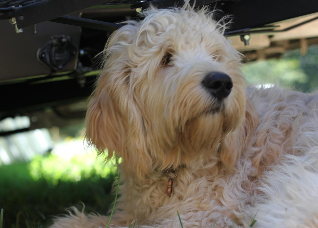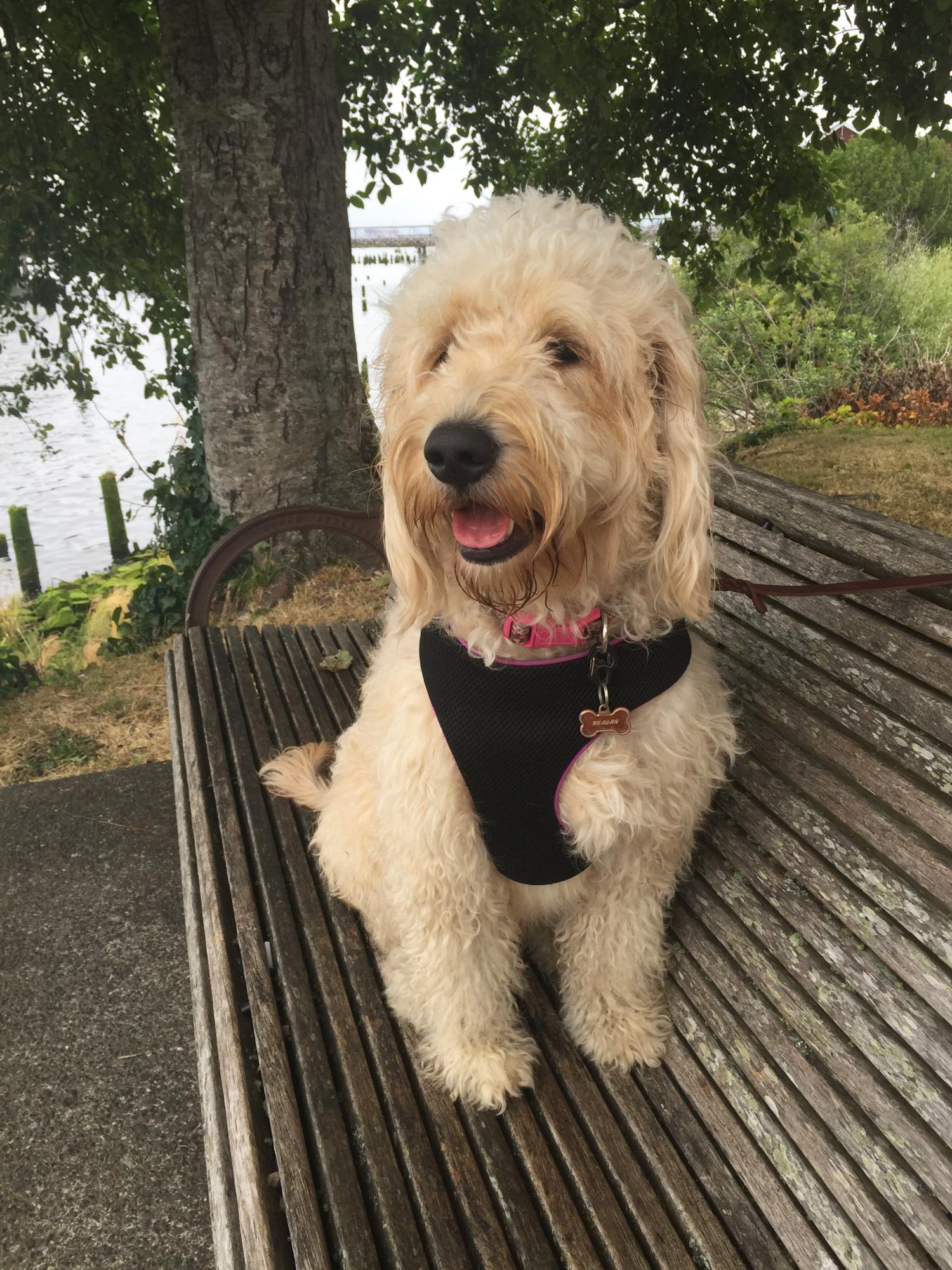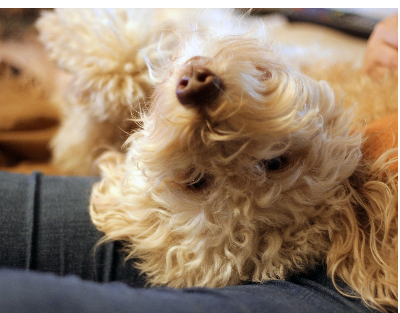
The Goldendoodle is a crossbreed between a Golden Retriever and a Poodle. Opening your heart and home to a crossbreed is like opening a beautifully wrapped package on your birthday: it's exciting, but you never know what's inside.
It’s often assumed that a cross breed will combine the best of two or more breeds, but genetics doesn’t always work that way. The way genes express themselves is not always subject to a breeder’s control, even less so when two different breeds are crossed. Because they are a cross breed, their traits are not fixed, so there is not a guarantee that the Goldendoodle puppy you purchase will fall into the desired weight range or coat type when all grown up.
Goldendoodles have a moderate activity level. Some Goldendoodles may be more active and will need a good walk or active playtime each day, and if you’re interested (and the dog's overall health is good enough), they are athletic enough to participate in such dog sports as agility, flyball, obedience, and rally. They can also be excellent therapy dogs.
Both of the breeds used to create Goldendoodles tend to be smart and learn quickly. If you begin socialization and training early and use positive reinforcement techniques such as praise, play, and food rewards, you will be met with a wonderful companion.
Since Goldendoodles are extremely social, outgoing, and non agressive dogs that thrive on human companionship they have a great desire to please and learn. Both parent dogs, poodle and golden retriever, score in the top 4 of the 150 smartest dog breeds. They are incredibly intelligent and eager to please. Coupled together with low to non-shedding coats, this temperment has proven to make goldendoodles perfect candidates for service work as well as family pets.
.


Tidbits of information for you and your new puppy
Tips For Dogs
Do you enjoy being a dog owner? There is a reason why they call dogs a man’s best friend, as they sure do make a great companion to just about anyone. They are affectionate, active and love to have a good time. That’s why they are excellent company. This is why you must be a great companion to your dog and give them the care they deserve. Read on to find out more.
Take the time to make sure your house is dog-proofed. Don’t take a dog into your home without being sure that it is safe from top to bottom. Cleaning supplies and medications should be locked away, and any indoor trash cans need to be put in a cabinet. Research the toxicity of plants you own, and move or remove anything that might be an issue.
It is a good idea to use hand signals when you are trying to train your dog, instead of just relying on verbal commands. Your dog might learn commands more easily using this approach. Try each way to see what works well with your dog.
Your dog’s nails need to be trimmed regularly. The nails can cause the dog discomfort if they start to curl under. These can be trimmed at home if you use nail clippers from the store. If you can’t do it by yourself, you might want to try the groomers; it does not cost a lot.;
Never leave a dog outside for long periods of time. This is common for people to do, but dogs should interact with others. If you only have one dog, he can get lonely outside. In addition, in extreme weather, you must bring your dog inside to protect it from the weather and temperature extremes.
Some dog breeds are more likely than others to develop certain health issues. Research the heritage of your pup and learn how to prevent any common problems. Also, talk to your vet about things that can be done to increase the odds for your dog’s breed.
If your dog has separation anxiety or you wish to be really nice to them, keep music on while you are going to work. Having noise will help your dog feel more secure and comfortable while you are away. This is a good way to keep your dog from feeling lonely.
Be certain a lost dog can be returned to you by giving him some identification. A collar with identification is a great way to ensure that your dog is found and returned if it happens to get lost. The tag should include your name and contact information as well as the name of your dog. It is also possible to get your dog micro-chipped.
Stay involved politically for your dog. Look to see if your local government is passing laws which limit dog owners’ rights. Sometimes, a small number of bad dogs get more publicity than a large number of good dogs. Be sure to voice your concerns in regards to dogs and dog owners by staying in touch with local officials.
Keep vet appointments for your dog. Your vet can detect any health problems before they are too serious. By having a physical each year, you can avoid unnecessary expenses later on and your dog will not suffer.
It isn’t unusual for dogs to injure their paws by stepping on bits of glass or other debris. If your dog experiences a cut, wash the area with antiseptic and put a bandage on it. Deep or serious wounds must be seen by a vet.
Make wise choices when it comes to your dog’s diet. You’ll find a wide variety of food to buy, but they’re not one-size-fits-all. Choose the food that fits both your dog’s age and size. Serving table scraps to your dog may be cost effective, but it does not provide a balanced and healthy diet for your dog.
You should be firm with your dog. Dog owners may feel that they can let their dog destroy toys or that it’s okay for them to eat table scraps. That usually happens with the cutest dogs! But, if you stay firm, you can avoid accidents. For instance, you might want to give your dog a few scraps after dinner, but it may cause the dog to feel entitled to the full plate.
Don’t have expectations for your dog that are too high. He can’t attend to tasks as long as you are able to. Train for a couple of minutes at a time to ensure you don’t turn him off training.
Be as kind to your dog as he is to you. If you use what you have learned here in this article, you’ll be sure that you’re taking great care of your pet. Your dog deserves longevity and happiness, and you can provide that for him.
If you are allergic to dogs, the Goldendoodle or Groodle may just be the perfect fit for you!
This lovable and playful breed is a cross between a Poodle and a Golden Retriever. Ready to learn a little more? Here are some amazing facts about the Goldendoodle: Goldendoodles are considered Newbies. Did you know Goldendoodles are a relatively a new dog breed? They first appeared in North America and Australia in the 1990's after breeders realized a larger Poodle hybrid would appeal to people who wanted a bigger hypoallergenic dog. This designer dog is Naturally vigorous. Most Goldendoodles are first or second generation hybrid or designer dog. Animal breeders use the term "hybrid vigor" to refer to a certain vivacity and resilience displayed in the first generation's behavoir due to breeding two purebred dogs. This is especially true when the parents are very different dog breeds. Dogs with hybrid vigor are usually far healthier then either of the dogs purebred parents. They can also benefit from having the best qualities of both breeds. Hybrid vigor gradually disappears over successive generations. Got Allergies? Don't grab a tissue, Grab a Goldendoodle! Just like most Poodle hybrids, Goldendoodle do not shed very much. This makes the dog a great choice for people that are mildly allergic to animals. A Goldendoodle's coat is much shaggier then a Golden Retriever but not as curly as a Poodle coat. The color of the Goldendoodle can vary and may appear orange, cream, dark brown, gray or black. Although some dogs have a coat with two or three colors. For people who have more severe allergies it is best to get a second generation F1B crossback. The term crossback is used when a first generation hybrid is bred with a purebred dog that is the same breed as one of the hybrids parents. Geneticlly speaking, a crossback puppy bred in this way is a first generation cross. So a crossback Goldendoodle puppy has one parent that is a Goldendoodle and one parent that is a Poodle. The objective of this type of breeding is to produce dogs that will shed less. The coat of a first generation backcross ( since it is one part Golden Retriever and three parts Poodle) is far less likely to shed, making it a far better option for a dog owner or a family member with severe dog allergies. You can see into the future! Predict what height and weight will be as an adult dog. Did you know you can calculate how much your puppy will weigh and how tall it will be as an adult? Simply add both of the parents height and weight together and then divideing that number by two. Goldendoodles are divided into three main size categories. The standard size for the breed is more then 45 pounds ( with the largest Goldendoodle weighing more then 100 pounds ) with a medium sized dog is usually between 30 to 45 pounds while an adult miniture Godlendoodle can weigh between 15 and 30 pounds. Mini Goldendoodles are smaller because one of the parent dogs are a toy poodle. Grooming needs may vary from one Goldendoodle to another but depending on the hair it shoudl be combed and washed every couple of weeks. A Godlendoodle's hair can grow about 8 inches long with it is not trimmed. The hair aroud the belly and tail area should be trimmed and kept short as it is more sanitary for the dog. Likewise a dog owner can trim the dogs facial hair if it grows over the eyes and it can't see. Goldendoodles are naturally gifted at serving others. This breed is well suited to serve other people. Goldendoodles make excellent guide dogs and therapy dogs. For example, they could be a trusted seeing-eye dog for a blind person. This type of dog breed can also be a great companion to an elderly person in hospices, sick people in hospitals, and other people in nursing homes who may need comfort. The dogs have a very strong desire to learn new commands and other tricks. This can make training them a real pleasure for both the pet and the owner. Godlendoodles are usually very lovable and social pets. The dog can form long lasting bonds with family members and other pets that are in the household. Goldendoodles are usually happiest when they are able to socialize with other dogs and humans. If you work or travel a lot this could cause problems with this particular breed. The dog may act out or develop behavioral problems if they spend too much time alone. No Outrageous Vet Bills! Most Goldendoodles are very healthy. As we have previously mentioned, a first or second generation Goldendoodle are typically healthier then both of its purebred parent dogs. As a result, there are no serious health concerns associated with the Goldendoodles. Although they can develop some of the health issues that are common to the Golden Retriever and Poodle. Genetic screening can minimize these problems. Goldendoodles are naturally quick-witted and very loyal to their owner. Regardless if you already own this lovable breed or are thinking of adding one to your family, these amazing facts can give you an idea of why the Goldendoodle is a favorite among many dog lovers.